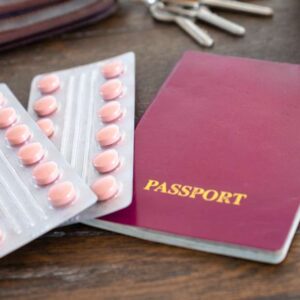
Study Reveals the Dark Side of Sleep Meds
I’m sure you know by now that quality sleep is crucial for good health.
Poor sleep, on the other hand, is linked to all kinds of health hazards, including obesity, diabetes, heart disease, stroke, depression, and anxiety.
It’s the primary reason people opt to take sleep medications.
But what if the pills you’re taking to help you sleep are actually setting you up for a nightmare down the road?
A shocking new study reveals that the “harmless” sleeping pills taken by millions could be paving the way to disability later in life.
And if you’re over 50, you’ll want to pay close attention to this discovery…
A groundbreaking study in the journal Sleep uncovered a disturbing link between sleep medications and future disability.
For every year a person experiences increasing insomnia, their risk of disability jumps by 20 percent.
And here’s the kicker: a similar level of risk was associated with increased usage of sleep medications.
We’re not talking about minor inconveniences here. The disabilities identified in the study included trouble with essential self-care activities like dressing, eating, toileting, and showering—basic activities most of us take for granted.
Even worse, many over-the-counter and prescription sleep medications don’t even work. They might knock you out for a few extra minutes, but they’re not giving you the restorative quality rest that your body needs.
And that’s not all.
According to a previous study by the same research team, sleep medications make falls more likely for older adults. So not only might these pills be setting you up for long-term disability, but they could also increase your risk of a serious fall in the short term.
It’s a double whammy that the drug companies aren’t exactly advertising in their glossy ads.
So, what’s an insomniac to do? Instead of reaching for that pill bottle, consider these safer approaches to improving your sleep:
- Create a consistent sleep schedule—going to bed and waking up at the same time every day.
- Make your bedroom a sleep sanctuary—cool, dark, and quiet.
- Limit screen time before bed. Phones and tablets emit blue light that interfere with your body’s melatonin production.
- Try relaxation techniques like deep breathing or gentle stretching before bedtime.
- Cut back on caffeine and alcohol, especially in the afternoon and evening.
- Get regular exercise, but not too close to bedtime.
- Consider cognitive behavioral therapy for insomnia (CBT-I), which is more effective than medications for long-term sleep improvement.
Sleeping pills might seem like a quick fix, but the long-term costs to your health and independence could be steep. And unlike the fine print that scrolls by at lightning speed during drug ads, this is a warning worth paying attention to.
P.S. What is a healthy night’s sleep? Three critical criteria.
Source:
Tuo-Yu Chen, Soomi Lee, Orfeu M Buxton, Late-life disability may increase with more frequent insomnia symptoms and sleep medications use over time, Sleep, 2025; zsaf098
Written By Dr. Scott Olson, ND
Nearly 25 years ago, failed mainstream medical treatments left Dr. Olson in constant pain – and his health in ruins. And that’s when he did something REVOLUTIONARY. He began his career in medicine – and dedicated his life to uncovering the true, underlying causes of disease.
Through his innovative medical practices in Tennessee and Colorado, Dr. Olson has helped cure countless seniors from across America of arthritis… heart disease… diabetes… and even cancer. All without risky prescription drugs or painful surgeries.
View More Free Articles
Study EXPOSES Hidden Danger Lurking in Your Car
We think of our homes and cars as safe havens. But according to a startling new study, they may be flooding your lungs with microscopic plastic particles—every single day. Researchers in France recently found that adults inhale an average of 68,000 microplastic particles daily from indoor air alone. To put that in perspective, that’s about...
Mailbag: Is Modern Food Making You Snore?
“What can cause snoring, and is there a way to correct this issue?” —Seeking Silence Hi Seeking, Snoring happens when the soft tissues in your throat relax and vibrate as air passes through during sleep. While several factors can cause snoring—from sleep position to nasal congestion—I want to share one trigger that might surprise you....
Simple Food Swap SLASHES Dementia Risk 28%
Let’s be honest… who would jump at the chance to cut their dementia risk by 28 percent. And no, you don’t need to run marathons, survive on broccoli, or learn to play the zither (whatever that is) to make it happen. All it takes is one easy swap—something that’s probably already in your refrigerator. Researchers...
This SMART Floss Exposes Hidden Health Danger
Scientists have created dental floss that doesn’t just clean between your teeth—it also tracks your stress while you’re flossing. Now, I know what you’re thinking… “Great—now even flossing is going to stress me out by telling me how stressed I am.” But this fascinating new tool from Tufts University could be a game-changer for understanding...
Is This "Safe" Sweetener Damaging Your Brain?
The headlines are alarming… “Popular Sugar Substitute Linked to Brain Cell Damage” and “Erythritol Could Damage Critical Brain Barrier” are just two of the dozens I’ve spotted recently. But before you toss every sugar-free product in your pantry, let’s take a closer look at what this study actually shows—and what it doesn’t. The latest research...
This Summer Threat Could SPIKE Your Blood Sugar
Picture this… It’s another scorching hot summer day. You crank up the air conditioning while watching the weather forecast, which predicts yet another “record-breaking” heat wave. It’s starting to feel like just another miserably uncomfortable summer. But what you might not realize is that—if you have diabetes—those rising temps could do far more damage to...
Move Over Yogurt—5 Foods That Pack MORE Probiotics
Let’s talk about your gut. The microbiome is the collection of trillions of bacteria and other tiny organisms that live in and on your body—especially in your gut—and help keep you healthy. I’ve written often about how vital it is to maintain a healthy microbiome. And you might have dutifully added yogurt to your shopping...
Is Your Heart Older Than YOU?
Maybe you feel young for your age. Good energy, decent sleep, eating your veggies. But what if I told you your heart might be a decade older than the rest of you? That’s exactly what researchers at Northwestern University found in a new study published in JAMA Cardiology. The average American woman’s heart is about...
Mailbag: 3-Pronged Attack CRUSHES Diabetes at the Source
“They told me I might have diabetes, so I would like to know how I can battle and eliminate diabetes.” —Fighting Back Hi Fighting, You have the exact right attitude—it will be your best weapon in this battle. Let’s face it, receiving a diabetes diagnosis is disturbing. You’re sitting there, shocked and wondering what it...
7 Natural Ways to Beat Jet Lag and Motion Sickness
Are you trying to squeeze in one last vacation this summer? Maybe it’s a beach getaway, a cross-country flight, or even a cruise. But let’s be honest: nothing takes the shine off a vacation faster than feeling nauseous on a boat… or jet-lagged and groggy for days after a flight. So, let’s talk about how...









